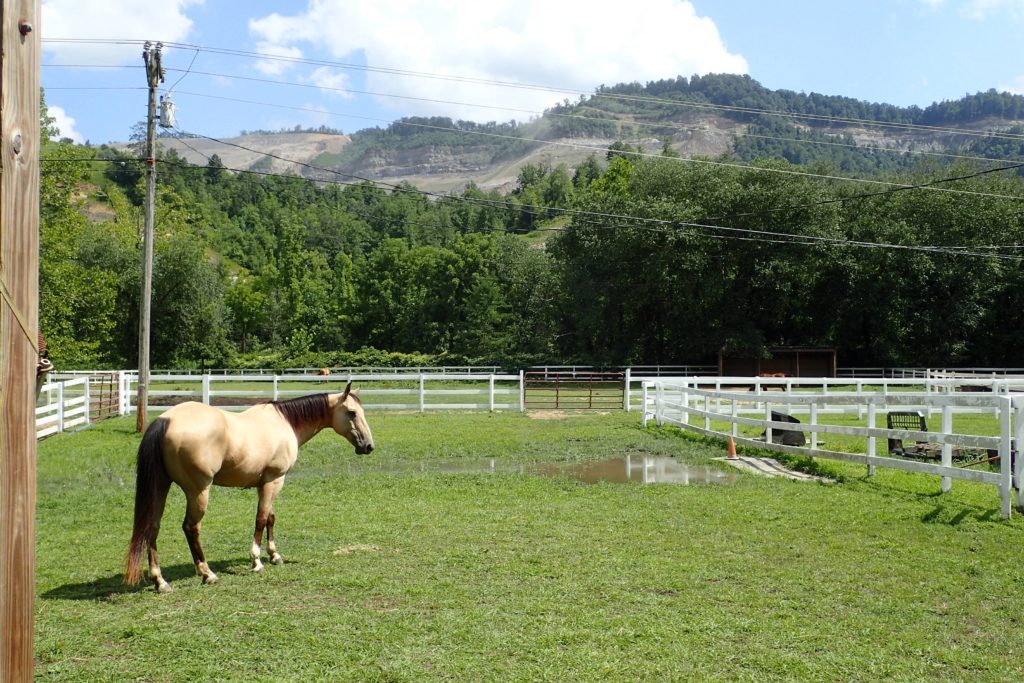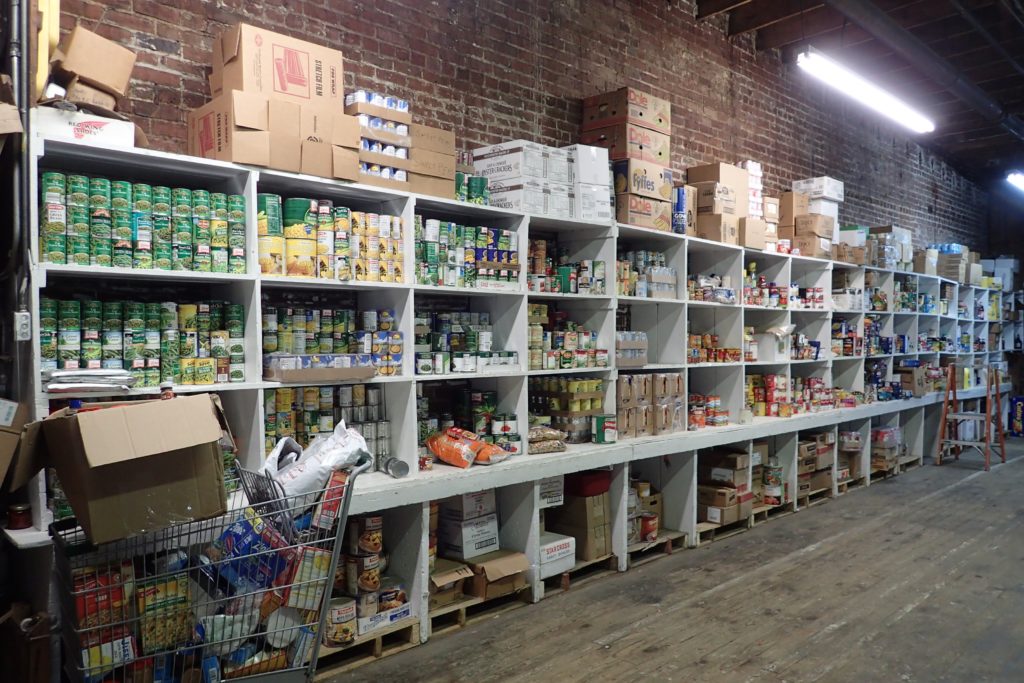Last week, Feed the Hunger staff and Board members trekked to eastern Kentucky to meet and interact with several of our dear partners there. We went because FtH food has been distributed to needy people in that area for several years now through feeding programs, backpack programs, and other means. We wanted to see how, with God’s provision, they are using their gifts (and the food many of you helped pack) for His kingdom.
I haven’t been to many of the places our food ends up because I work more on the digital and writing side of things. And after hearing about the depressed economic conditions that plague the region, I was a little apprehensive about making the trip. What if I saw things that made me feel uncomfortable? What if we came across as “poverty tourists” who would go back home and feel guilty about having so much? But what if God wanted me to see and feel those things?
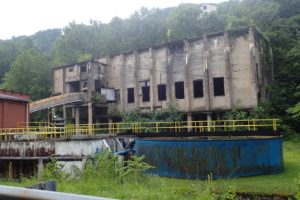 Some of the towns we visited you may have heard of, but most you probably haven’t: Lynch, Benham, Cumberland, Harlan, Langley, and Salyersville, just to name a few. What they all have in common, though, is a deep connection to perhaps the most maligned industry in America—coal. Now, I’m not looking to start a debate about the economics or environmental impact of coal (and certainly staying away from politics!), but the result of coal companies leaving—sometimes abandoning—the towns they built is unmistakable.
Some of the towns we visited you may have heard of, but most you probably haven’t: Lynch, Benham, Cumberland, Harlan, Langley, and Salyersville, just to name a few. What they all have in common, though, is a deep connection to perhaps the most maligned industry in America—coal. Now, I’m not looking to start a debate about the economics or environmental impact of coal (and certainly staying away from politics!), but the result of coal companies leaving—sometimes abandoning—the towns they built is unmistakable.
I saw firsthand the cycle of poverty that traps residents in dwindling communities. It takes money to leave, but you can’t sell your house because it’s a hundred years old and there’s little market for it. Even if you could sell it, the amount you’d receive wouldn’t allow you to live anywhere else. Plus, when industry left, jobs left too, so saving up to move can be an overwhelming challenge.
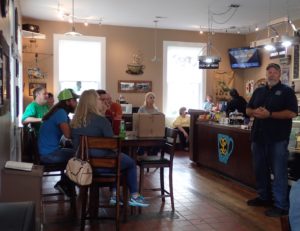 With all that said, the people we met were nothing like the downtrodden, hopeless stereotype I was expecting. No, they were very much the opposite, and it was my shortsightedness that was responsible for that expectation. One thing I saw over and over again, even to the point of becoming a theme for the week, was that it truly is possible to live by faith. This is not the “faith” we sometimes think of and talk about in Christian circles—faith that says, “Well, I hope this works out,” or, “I’m not really sure what God wants me to do, so I guess I’ll try doing this.”
With all that said, the people we met were nothing like the downtrodden, hopeless stereotype I was expecting. No, they were very much the opposite, and it was my shortsightedness that was responsible for that expectation. One thing I saw over and over again, even to the point of becoming a theme for the week, was that it truly is possible to live by faith. This is not the “faith” we sometimes think of and talk about in Christian circles—faith that says, “Well, I hope this works out,” or, “I’m not really sure what God wants me to do, so I guess I’ll try doing this.”
The faith I saw was like the faith of Abraham, Daniel, Esther, and Paul (among many others). It is a faith that says, “God is leading me to do this, so I’ll do it and wait on Him to use it for His glory.” Abraham followed God to a new country without reservation; Daniel had faith to stand up to an empire because he believed God would be with him; Esther faced a king to deliver God’s people; and Paul went through incredible persecution to bring God’s revelation to the Gentiles.
In Kentucky, I saw a leader with a vision to rescue a mining town from drugs, broken homes, and depression. Another led a food pantry that not only fed physical hunger, but developed young people’s minds and spirits. One worked within the public school system to bring God’s love to struggling students. Yet another worked as a pastor, rancher, farmer, and community leader—all on an extremely limited budget. These are just a few of the people we met who continually operated by faith, not knowing what the next step might be, only that God would tell them when they needed to know.
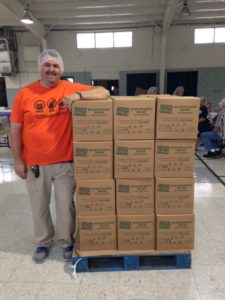 Perhaps the event that stood out the most was the first-ever Packathon in the state of Kentucky. Licking River Baptist Church, a small congregation in Salyersville, had traveled all the way to Burlington, NC, two years prior to participate in our All-American Packathon that summer. They wanted to host their own event in their home state, so they planned and fundraised for months until they had reached their goal. Last Friday and Saturday, we helped them put their planning into action. What a great experience! Church members and guests jumped in with both feet and packed over 30,000 meals, all the while celebrating what God had allowed them to do to reach their community and the world (they requested that part of their food remain in Kentucky and part be sent to Haiti).
Perhaps the event that stood out the most was the first-ever Packathon in the state of Kentucky. Licking River Baptist Church, a small congregation in Salyersville, had traveled all the way to Burlington, NC, two years prior to participate in our All-American Packathon that summer. They wanted to host their own event in their home state, so they planned and fundraised for months until they had reached their goal. Last Friday and Saturday, we helped them put their planning into action. What a great experience! Church members and guests jumped in with both feet and packed over 30,000 meals, all the while celebrating what God had allowed them to do to reach their community and the world (they requested that part of their food remain in Kentucky and part be sent to Haiti).
Once I returned home, I tried to view the experience with the correct perspective. It wasn’t about what anyone did or didn’t have. It wasn’t about some secret spiritual knowledge. It was regular Christians living out the faith we read about in the Bible and seeing God use it to bring people to Jesus Christ and give them hope both here and for eternity.
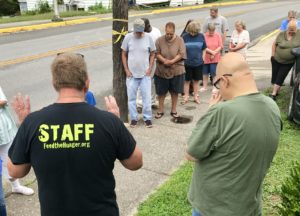 Our partners and those to whom they minister are a great encouragement to me. They exemplify Colossians 2:6–7, which says, “So then, just as you received Christ Jesus as Lord, continue to live your lives in him, rooted and built up in him, strengthened in the faith as you were taught, and overflowing with thankfulness.” I pray you would be encouraged too!
Our partners and those to whom they minister are a great encouragement to me. They exemplify Colossians 2:6–7, which says, “So then, just as you received Christ Jesus as Lord, continue to live your lives in him, rooted and built up in him, strengthened in the faith as you were taught, and overflowing with thankfulness.” I pray you would be encouraged too!
Matthew Byrd | Ministry Advancement
